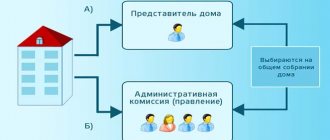Hello! In this article we will talk about property management.
Today you will learn:
- Distinctive features of real estate management as a type of business;
- How to make money on property management;
- And how to avoid the most common mistakes.
Investments in real estate are one of the most attractive types of investments in Russia. Unlike the rest of the world, where other, more liquid assets rule the roost, the population of our country prefers stability over higher profits. But despite the simplicity, at first glance, generating income from owning real estate can be a difficult task for an unprepared person. It is for such cases that property management exists.
Introduction
Nowadays property management is becoming more and more popular in Russia. This is due to the fact that despite the crisis and the difficult recovery that follows it, there is more and more real estate.
It's no secret that the most popular investment among individuals in Russia remains the purchase of real estate. While businessmen invest their money in commercial buildings that will bring profit to tenants, ordinary citizens prefer housing, with profit in the form of rising costs and rental payments. If the majority of citizens can somehow handle residential real estate themselves, but this will cost them less and make the property much less attractive to potential clients, then managing commercial real estate will require the involvement of truly knowledgeable specialists. Now let’s talk about what property management is.
The term property management itself can be interpreted in a narrow and broad sense. Let's start with a narrower one.
Property management in the narrow sense is the performance of all operations with real estate in the interests of the owner.
These operations include:
- Maintaining the condition of the building;
- Search for tenants;
- Collection of rent;
- Resolving all conflicts.
It is worth considering that both an individual, the owner of residential real estate, and associations of people who own commercial real estate can cooperate with a management company.
The approach in both cases will also be completely different. In the first case, the management company will need to evaluate the property, agree on all the details with the owner, set a price and find clients to rent housing. A one-time commission is provided for such transactions.
When working with legal entities or influential businessmen who own commercial real estate, the management company may also be responsible for an additional task in terms of bringing the premises to readiness. This can be either the initial arrangement of an office or warehouse, or a complete renovation in agreement with the tenant.
In order to work with commercial real estate, much more knowledge and investment will be required compared to residential real estate. At a minimum, you will need a client base, as well as a good appraiser, who will help you correctly determine the value and find a client.
At the same time, the management company also bears the responsibility of working with the maintenance personnel of buildings or structures. Most often, these are clearing companies that provide their services, as well as other support staff that provide technical support for facilities.
Real estate management in a broad sense is the activity of all structures for managing the real estate market in general and private properties in particular. The main body for real estate management is the state, which establishes the legal framework that regulates relations in the field of purchase and sale of real estate. The next subject of real estate management will be the real estate market itself, as well as the companies and portals that provide access to it. They also form their own “order” for regulating all transactions and subsequent relationships.
Real estate management in a broad sense is a gradually narrowing pyramid of regulators that in one way or another influence the market and the subsequent use of real estate, in order to meet all the interests of both the seller and buyer, and the landlord and tenant.
In this article, we will consider property management in a narrow sense, because it is what interests owners, as well as people interested in working in this direction.
A little about why property management is great for property owners:
- Saves time >;
- Increasing demand for real estate;
- Solving all problems with the legal side of the issue;
- Preservation of property.
All these advantages are a consequence of the work of professionals. Since they often have access to large bases of potential clients, and also have established interactions with most advertising platforms, the announcement that there is a new rental offer will be seen by many interested clients.
Thanks to the fact that the advertisement is presented correctly, presenting all the positive aspects, the competitiveness of your offer will also increase.
Working with property management companies is a great opportunity to create truly passive income. The owner will only need to indicate to the company what he wants to receive and within what time frame.
She will provide him with a list of expenses that will need to be incurred during the preparation of the property, as well as an invoice for her services. Minus these commissions, the owner will receive his profit at the end of each period, without making any effort at all.
Main stages of the property management concept
The concept of commercial real estate management is the implementation of a systematic approach to the creation, operation, development, evaluation and management of real estate.
The concept covers activities related to the organization and conduct of the entire complex of technical, economic, legal examinations of real estate objects. assets that ensure maximum effect and include planning functions (strategic and operational) in the period before and after the start of operation of the facility; coordination of the actions of engineering, maintenance and administrative personnel; control and evaluation of personnel activities.
Carrying out technical, economic and legal examinations is closely related to the life cycle of objects and the development of practical recommendations for the effective management of specific areas. objects, their interconnection into a unified management system and the strategic development of the entire complex.
Stages of the property management concept:
At the 1st stage, an analysis of available real estate objects is carried out, an assessment of their market condition is carried out, and trends in the development of the real estate market are studied.
This stage involves performing the following examinations:
— monitoring and analysis of the real estate market;
— analysis of the location of real estate objects;
— analysis of the legal status of real estate objects;
— technical examination of the condition of real estate objects;
— economic and managerial expertise.
The legal validity of the real estate management strategy lies in its examination from the point of view of current legislation, urban planning standards, and promising solutions for the district planning of the site on which the object will be located; from the point of view of the limited local administration and the requirements of the local population.
Technical examination of real estate objects is carried out to assess the physical condition of load-bearing and enclosing structures, to analyze the quality of the architectural and space-planning solutions of buildings. No less important is information about the material of the main load-bearing structures, data on the provision of buildings with engineering systems, their composition and technical condition. Such an inspection for new construction is carried out on the basis of technical documentation; for a constructed object it includes the study of technical passports and inspection of the object by specialists.
During the technical examination, it is necessary to conduct an examination of the foundation in order to identify potentially dangerous areas, as well as the foundations of the building, present the results and recommendations for strengthening structures if necessary, examine the engineering equipment and conclude what equipment is replaced and when.
The purpose of technical expertise is to obtain information about the functions of the object and the space-planning solution. The result of the technical condition of the real estate object was the development of a technical conclusion on the repair and restoration of damaged structures, on measures to ensure the safe operation of the object. Based on the percentage of wear, a general assessment of the current condition of the building is given, then all the reasons causing the poor or unusable condition of the structure are given and recommendations are given for strengthening structures, repair technology, restoration, and troubleshooting.
Documentation for technical inspection : site plan; technical passport for the building and equipment; geodetic survey results; design and estimate documentation; floor plans; acts of acceptance of the object from the builders; internal network engineering diagrams; underground communications diagrams; executive drawings of grounding loops with welding reports; reports of previous technical examinations of the object.
In the process of economic justification for the selected planning period, the income and expenses of the property are forecast, financing problems are solved, cash flows from the property and discount rates are determined to satisfy the owner’s requirements. During the economic examination, it is necessary to analyze the existing use of the property, determine the budget planning period and predict the amount of expenses and income from the property, draw up a list of all possible strategies for managing the facility, a list of measures for the main stages of management in the context of potential management strategies. The final result is the drawing up of budget options for income and expenses for various strategies for managing real estate.
The budget is the basis of all projected activities for the management of real estate. It reflects the strategy and management plans for the planned period.
Management expertise: management is a factor through the prism of which all possible options for the development of an object are passed through. Managerial validity has two components: compliance of the management strategy with the goals of the owner and the available management resources.
Stage 2 : development of a strategy and program for property management. Real estate management processes are planned, a general strategy for the formation and management of a real estate portfolio is determined, real estate development processes are planned in relation to each stage of the object’s life cycle, a management program is drawn up with the following questions: choice of And the most effective option for using a real estate object; determination of the entity that will implement the management program; determining the basic elements of a marketing strategy.
Stage 3 : implementation of the management program.
, an assessment of the results of the implementation of the strategy and program for managing real estate is carried out activities of the management company at the previous 3 stages, the owner, together with the representative of the management company, compares the planned results with the actual ones, if necessary, makes changes and adjustments to previously adopted plans or strategy or to the management program that is currently being implemented.
Definition
By real estate management we mean the implementation of a detailed property management strategy, which includes such activities as:
- Creating favorable and safe conditions for clients;
- Ensuring the competitiveness of the property in the market and thereby generating a sustainable cash flow;
- Interaction with insurance companies and brokers;
- Development and implementation of energy saving measures;
- Development and implementation of a plan to optimize operating costs;
- Involvement and control of the work of specialized organizations;
- Conducting site inspections to maintain impeccable global standards of quality of services provided;
- Development and implementation of a plan for periodic scheduled inspections and repairs of engineering equipment;
- Organization of a system for recording tenant requests, monitoring their implementation;
- Prevention of emergency situations;
- Development and implementation of a plan for current and major repairs;
- Development and implementation of a policy for attracting, retaining and rotating tenants;
- Maintaining lease agreements, monitoring the fulfillment of contractual obligations;
- Generating additional income;
- Interaction with government agencies;
- Formation of a positive image of the object;
- Creating conditions for transparency and trusting financial relationships.
Property management methods
The following methods of property management are distinguished:
- legal management methods - ensure the distribution and combination of rights to real estate;
— economic management methods — provide management of income and costs generated during the operation of real estate;
— organizational management methods — provide organizational influence on real estate management processes;
— technical management methods — ensure the maintenance of the property in accordance with its functional purpose.
Legal management of real estate can be internal and external.
Internal real estate management is the activity of a real estate market entity, regulated by its own regulatory documents (code, charter, regulations, etc.).
External real estate management is the activity of government agencies (or their authorized representatives) aimed at creating a regulatory framework and monitoring compliance by all subjects of the real estate market with established norms and rules.
Legal methods of property management include:
— a system of legislative and regulatory regulation and control of the behavior of all subjects of the real estate market, carried out by government bodies;
— preparation and registration of title and other documents for real estate;
— selection and certification of the status of professional participants in the real estate market through licensing, registration, granting the rights of authorized persons by executive and state authorities to carry out transactions with state and municipal property;
— establishing mandatory requirements for the content and quality of various types of activities in the real estate market and for its participants;
— control over compliance by all market participants with established norms and rules;
— introduction of prohibitions and sanctions for deviations from regulatory requirements when making transactions with real estate and maintaining law and order in the market;
— purchase into state ownership of any real estate for public needs.
Economic methods of real estate management are carried out using:
1) systems of taxation of property and benefits (tax rates, exemptions from them);
2) regulation of the discount rate (discount policy of the Central Bank);
3) issuance and circulation of housing certificates;
4) providing citizens in need of improved housing conditions with free subsidies for housing and construction on a commercial basis;
5) implementation of state target programs;
6) depreciation policy;
7) foreign economic activity.
Organizational methods of real estate management include techniques and means of organizational influence (impact) on the management process. The objectives of these management methods include the development of provisions that determine the composition of organizational and preparatory activities and methods for their implementation. In this sense, they are equivalent to the functions of the organization. Organizational methods appear in the form of structural transformations, standardization and regulation. Structural transformations include the development and periodic review of the structure of construction organizations and the hierarchical structure of higher management bodies.
The scope of these methods includes establishing the scope of powers of managers of a certain rank, their legal status and the relationships between linear and functional links in the management apparatus. As a result of standardization, the costs of materials and energy resources per unit volume of work are established: time standards, output; headcount standards, controllability standards; ratios of categories of different types of workers; working hours and vacations. The effectiveness of organizational regulation depends on its combination with material and moral incentives, as well as the application of appropriate sanctions for violation of norms.
Regulation is the influence on the activities of work collectives and individual workers through organizational regulations, resolutions, instructions and rules, administrative acts that are mandatory for implementation over a long period of time.
Using regulations:
— the boundaries of the activities of various organizations in the production process are clarified and relationships between them are established;
— the regime for performing construction and installation work and the entire production process as a whole is established;
— rules governing the activities of teams and individual officials (for example, Regulations on the foreman, on the work contractor, on departments of a construction enterprise);
— staffing schedules and job descriptions are drawn up (functions, responsibilities, powers, relationships and accountability).
Technical methods are provided during the operation of real estate and are discussed in detail in the sections relating to the operation and maintenance of real estate.
Advantages and disadvantages
For the owner of the premises, there are several advantages of this form of property management:
- Property held in trust is separated and accounted for on the manager’s balance sheet, so it cannot be foreclosed on for the owner’s debts (Civil Code of the Russian Federation, Art. 1018), this reduces the risk of losing real estate in crisis situations.
- All issues related to tenants, maintenance of the premises, and the conclusion of related agreements are taken over by the trustee. The owner only has the question of monitoring compliance with one contract.
- With the right selection of a management company, the owner’s profit increases, despite the costs of paying for its services. This is achieved through proven management schemes - optimal rental rates, increasing occupancy, reducing overhead costs due to the network effect, etc.
But there are also disadvantages:
- The main disadvantage of trust management is vulnerability from a tax point of view. The trustee must pay VAT from the amount of income from the use of property, including in the case of using a simplified taxation system (Tax Code of the Russian Federation, Art. 174.1)
- An unsuccessful choice of a manager threatens a decrease in income, and errors in the contract that do not allow full control over his activities can lead to a decrease in the market value of the property.
The requirement of the law for mandatory registration of such agreements can be attributed to both “pros” and “cons”. In addition to the costs of registration, such an agreement cannot be carried out “retroactively”, but at the same time, a copy of the agreement from the registrar serves as additional protection against possible illegal actions.
Commercial real estate management scheme
Analysis of the real estate market (assessment of the external environment) and analysis of the current state of the property (comprehensive assessment of the property) allow you to obtain comprehensive information about the property and its environment (at the micro and macro levels), which contributes to the creation or selection of the best management strategy for the property, taking into account the main goals owner and management company.
An assessment of the current and future (forecast) state of an object can have a significant impact on the owner’s goals in relation to the management strategy and on the goals of the management company in relation to the developed and implemented management program.
The goals of the owner and the goals of the management company can be combined into one general group - the goals of property management. Moreover, these goals in the process of real estate management are subject to constant adjustment, which, in turn, affects the property management strategy and, accordingly, the previously developed and implemented management program.
Commercial facility management scheme
Nevertheless, two fundamental goals of the owner and management company, as a rule, remain unchanged:
— minimizing costs at the stage of real estate operation, maximizing profits, which is more typical for a management company;
— maximizing the value of the property, maximizing profitability at the stage of operation, which is more typical for the owner than for the management company.
Only the owner should take an active part in creating a facility management strategy, and the management company can only act as a consultant. At this stage, the owner chooses the best option for further development of his property from an objective and subjective point of view, primarily based on personal goals.
Methods
In practice, there are three control options:
- An agency agreement is practically a real estate activity. The challenge is to find tenants and get them to agree to the required terms.
- Lease agreements with the right to transfer - for example, an office center is rented entirely from the owner by one large tenant, and then he is looking for entrepreneurs to sublease. Accordingly, trying to make money like this.
- Trust management is a complex service that requires a manager in its original sense. That is, you will have to not just look for tenants, but take care of the maintenance and modernization of the building, think through marketing, and rental policy. You could say, develop commercial real estate as a business.
By the way, the big advantage of transferring real estate to trust management is that it becomes a separate object of law. A separate bank account is opened for it, independent accounting is maintained for it, and it cannot be considered as an object for other debts (collections). Of course, unless this is a complete bankruptcy of the owner of the objects, in accordance with Art. 1018 of the Civil Code of the Russian Federation.
Taxation
If a simplified taxation system is applied by a trustee, he is obliged to apply the object of taxation “income minus expenses” (Clause 3 of Article 346.14 of the Tax Code of the Russian Federation), while in accordance with Art. 174.1 of the Tax Code of the Russian Federation, VAT is payable.
The article defines the specifics of paying VAT when carrying out transactions under a trust management agreement and does not establish exceptions for participants using the simplified taxation system.
When choosing a method of property management, it is necessary to take into account not only the potential profit, but also the emerging risks, as well as additional financial costs. Not for every property, concluding a trust management agreement will be the optimal choice; such a decision must be balanced and thoroughly considered.
Important
If you plan to engage in such activities, you will have to thoroughly understand several areas at once:
- Study the features of the general concept of commercial real estate , understand how this business works.
- Know the features of managing business centers, shopping and shopping and entertainment complexes, office and multifunctional premises.
- Build business processes in an organization - be able to create a system of interaction between departments of the management company, organize the work of cleaning, maintenance and legal services.
- Understand various agreements with tenants, employees, utility and construction organizations.
- Know tax and civil legislation.
- Have the knowledge and skills of an effective leader - use time management, practice different management techniques, learn quickly and be able to select only the important from the abundance of information.
- Understand marketing - be able to analyze the market, conduct research, set tasks for contractors.
- Manage the legal department - document support, development of lease agreements.
In addition, a good manager is distinguished by several professional qualities:
- Knowledge of negotiation techniques - the ability to achieve the desired result from anchor and other tenants, knowledge of the peculiarities of communication with representatives of different professions.
- Ability to manage personnel - a good manager knows how to correctly set tasks, takes into account whether the employee can complete the task, whether he has the necessary competencies, resources and authority for this.
- Quick response to changes - since the manager depends on someone else’s business, he will have to develop the skill of flexibility. A professional calmly reacts to crisis events and knows how to localize them.
- Developed networking ability - this helps to quickly make decisions on space occupancy. For example, for a new manager, two or three tenants leaving can be a problem. A well-connected person will quickly invite businessmen who are now looking for new areas for development to fill the vacant space.
Risk reduction
Managing real estate with the help of experienced professionals automatically means reducing the risk of becoming a victim of fraud. And there are a number of reasons for this:
- A realtor who has been working in this market for many years very quickly recognizes dubious schemes.
- Such a specialist knows how to draw up an agreement so that the property owner, even in the worst case scenario, would not be left without property. But many owners are afraid of this. Because of this fear, they even often refuse quite lucrative offers. But with a professional you don’t have to worry because he knows how to protect you.
- Fraudsters are often put off by the very fact that agents of a large company are involved in the transaction. Many people simply immediately refuse to participate in negotiations as soon as they see a realtor in front of them.
Thus, the owner does not have to spend a lot of time studying each offer or collecting a large amount of data on tenants or other persons. Instead, it may delegate such a task to an agent.
Work planning
Drawing up plans for the operational management of real estate and other types of management is a means of implementing ideas. Planning consists of setting goals and objectives, as well as determining the means necessary to achieve them .
When planning, management decides what the areas of activity in the field of real estate management will be and what areas and actions will be priorities.
Planning is the most complex and important stage of property management, therefore there are three subfunctions:
- Forecasting.
- Modeling.
- Programming.
Forecasting is a method of scientifically sound prediction of various options for choosing the directions of development of a given object in the future, taking into account interaction with the outside world. If forecasting is performed well, you can use the resulting feasible options as a basis for planning.
Forecasting options for managing your own real estate is carried out in the form of modeling or programming.
Modeling allows you to predict different situations and system states over the period established in the plans. The economic form of modeling is equivalent to the method of experimentation. Programming involves moving to a planned state based on currently available information. This includes developing algorithms, establishing a list of required resources, and defining a methodology.
For the successful implementation of the process of operational management of real estate and other types of management, it is necessary to set goals and objectives for different periods of time. In this regard, long-term, medium-term and short-term planning are distinguished.
Long-term covers a period of fifteen to twenty years. It defines general tasks and goals, and also selects a strategy. Medium-term planning includes a five-year period. The main goal of this type is the selection of effective means to achieve the goals.
Short-term (current annual) planning by quarter is a more detailed consideration of the findings of the medium term.
Choosing a company
Quite a few companies on the market claim that they provide trust management services; for example, almost every real estate agency has such a clause in its description. But in practice, there are not many specialized companies.
To narrow down your search, you need to identify companies that already have experience managing your type of property. What you should pay attention to:
- There must be an existing pool of objects in management It is imperative to take into account the size and class of objects; you should not apply for premises of 300 sq. m to a company that manages only shopping centers with an area of 50,000 sq. m. – even if they agree for some reason, such management will not be effective.
- Recommendations, reviews . You can try to communicate, if possible, with the owners of objects already under management.
- Check whether there are court decisions and pending claims against this manager and, if there are, read them carefully.
- The lifespan of the company and the legal entity on whose behalf the contract is concluded . Newly registered organizations should raise suspicion.
- The conditions that the company offers in its standard contract and the willingness to meet.
- Price of services.
What does a manager do?
Market analysis
These competencies allow the trustee to assist the investor even at the stage of selecting a property for subsequent rental. In the case of an existing object, its correct positioning in the market can significantly affect the amount of the final profit.
Sometimes, seemingly insignificant details allow an unprofitable business to get back on its feet . For example, changing the positioning of an office center from A-class to B can lead to an increase in occupancy by an order of magnitude, a significant reduction in maintenance costs and, as a result, an increase in the owner’s profit.
Planning
A pre-compiled waiting list of potential tenants allows you to increase occupancy, and a clear schedule for repair work reduces the downtime of an object or part of the space.
Search for tenants, advertising
Finding an effective pool of tenants is not an easy task. It is necessary to take into account the requirements for the tenant himself:
- solvency;
- timeliness of payment;
- compliance with the requirements of the owner of the facility;
- purity of intentions, etc.
It is also necessary to take into account factors affecting the object as a whole:
- non-conflicting range of goods (services) of tenants, as well as taking into account synergistic effects for certain groups of goods;
- taking into account the interests and selection of anchor tenants;
- determining the optimal composition of the tenant pool (theme, size of rented space, etc.).
The capabilities of a manager, with a pool of several dozen large objects, in terms of advertising, are also incomparable with the capabilities of the owner. The trust manager can significantly reduce the costs of advertising empty space due to the number of objects under management, more precise targeting taking into account accumulated experience, and personal offers.
If a company specializes in managing shopping centers, it can offer empty space to already proven tenants - chain stores at other sites.
Preparation and execution of a rental agreement
In addition to the registration procedure itself, the management company develops the terms of the lease agreement in such a way as to maximize its and the owner’s profits and ensure the safety of the property.
Too strict terms of the contract will scare off potential tenants, too soft ones will reduce profits.
Public utilities
For a large property, utility costs can amount to impressive amounts , the number of contracts can be in the dozens. The trustee, relying on his experience, selects convenient counterparties, and in some cases, due to the volume, taking into account other objects under management, achieves a reduction in tariffs.
Payment control
This responsibility includes not only monitoring the timely payment of rent, but also managing the rate and the possibility of rental holidays when necessary. Monitoring the market situation and surrounding competitors.
Organization of technical and consumer services
The rental rate and occupancy of the premises directly depend on the quality of service of the property.
In addition to utilities, the list of required additional services for various purposes varies greatly, so management companies usually specialize in one type of property.
For example:
- For warehouses, maintenance and repair of access roads are required, loading and unloading operations are often in demand, and special requirements for cleaning, security and access control systems are required.
- For office buildings - maintenance of ventilation systems, fire alarms and fire extinguishing systems, your requirements for building security, cleaning of premises, uninterrupted power supply, etc.
Management companies have their own services to perform this work or enter into contracts with trusted organizations.
Insurance
The obligation to insure an object can be assigned to both the manager and the owner . But, given that renting out real estate always involves risks of damage to the property or its loss, the owner should take care of resolving this issue himself.
Room modification
In the interests of increasing profits, it may be necessary to modernize premises or engineering systems.
To increase the rental rate, it can be advantageous to split one large premises into small sections. The boundaries of possible modification are specified in the trust management agreement.
Who is better to enter into an agreement with?
The apartment owner can enter into an agreement with a real estate agency, its representative or a private realtor. Essentially, they offer the same services, but I advise you to enter into an agreement with a trusted agency or its representative . Among private unknown agents there are often scammers. It is worth concluding an agreement with a private owner only in one case: if you or your friends have already worked with him.
After concluding the contract, the agency will assign a responsible agent to the apartment with whom you will be in contact. Or you will have a personal manager who will keep you informed, and different agents will come to the apartment. In any case, if the contract is concluded with an agency, it is more convenient. If problems arise, you will know where and who to go to. The main thing is to choose well-known, trusted companies.







